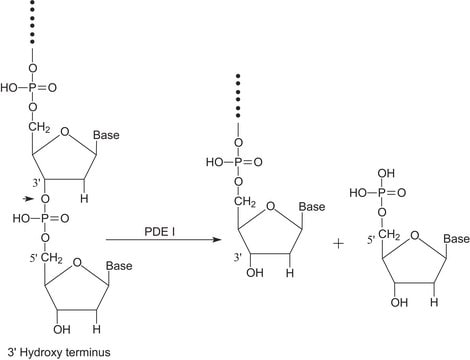EDEGLY
Enzymatic Protein Deglycosylation Kit
Synonym(s):
Glycosylation Release Kit
About This Item
Recommended Products
General description
Application
- protein deglycosylation
- deglycosylation of tissue factor pathway inhibitor (TFPI) α and β
- deglycosylation of native exo-β-(1,3)-glucanase EXG1
Features and Benefits
- two or more mg of glycoprotein is deglycosylated
- single reaction at neutral pH
- native & denaturing procedures
- no degradation of protein
- O-linked sugars containing polysialic acid are eliminated
- control glycoprotein provided
Kit Components Only
- PNGase F 1 mL/vial
- O-Glycosidase 20 μL
- α-2(3,6,8,9)-Neuraminidase 20 μL
- Fetuin Control .5 mg
- 5× Reaction Buffer .2 mL
- Denaturation Solution .1 mL
- Triton™ X-100 .1 mL
- β-1→4-Galactosidase, positionally specific 20 μL
- β-N-Acetylglucosaminidase 20 μL
related product
Signal Word
Danger
Hazard Statements
Precautionary Statements
Hazard Classifications
Acute Tox. 4 Dermal - Acute Tox. 4 Oral - Aquatic Acute 1 - Aquatic Chronic 2 - Eye Dam. 1 - Repr. 2 - Resp. Sens. 1 - Skin Irrit. 2 - Skin Sens. 1
Storage Class Code
10 - Combustible liquids
Flash Point(F)
Not applicable
Flash Point(C)
Not applicable
Certificates of Analysis (COA)
Search for Certificates of Analysis (COA) by entering the products Lot/Batch Number. Lot and Batch Numbers can be found on a product’s label following the words ‘Lot’ or ‘Batch’.
Already Own This Product?
Find documentation for the products that you have recently purchased in the Document Library.
Customers Also Viewed
Articles
There is no enzyme comparable to PNGase F for removing intact O-linked sugars. Monosaccharides must be sequentially hydrolyzed by a series of exoglycosidases until only the Gal-b(1-3)-GalNAc core remains. O-Glycosidase can then remove the core structure intact with no modification of the serine or threonine residue.
Information about Glycoprotein deglycosylation. The diversity of oligosaccharide structures, both O-linked and N-linked, often results in heterogeneity in the mass and charge of glycoproteins.
Deglycosylation Kits
N-Linked Glycan Strategies.
Our team of scientists has experience in all areas of research including Life Science, Material Science, Chemical Synthesis, Chromatography, Analytical and many others.
Contact Technical Service




